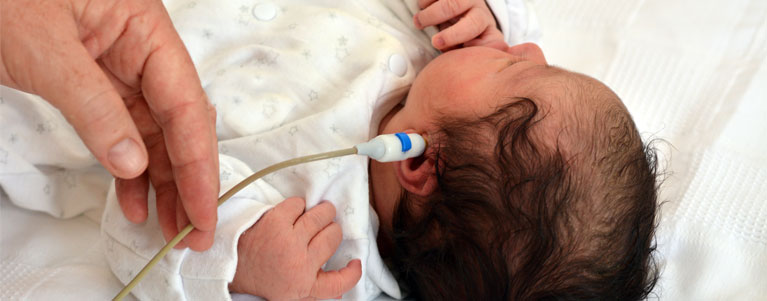HEARING DEVELOPMENT IN INFANTS
As infants develop, what are the “hearing milestones”?
Birth to three months of age:
- Begins to localize or turn towards interesting environmental sounds.
- Seems to “listen” to speech or sounds, pays attention.
- Awakens more easily to loud environmental sounds.
Three to six months of age:
- Localizes to environmental sounds.
- Smiles when you speak.
- Starts to understand a few words such as “no,” “bye-bye,” or “so big.”
- Starts to imitate some sounds.
Six to nine months of age:
- Says first meaningful word such as “mama” or “dada.”
- Responds to his or her name.
- Babbles and makes lots of different sounds.
- Responds to “no.”
Nine to twelve months of age:
- Turns to look when name is called.
- Responds to simple commands “give me,” “come here”
- Understands “bye-bye”
Twelve to eighteen months of age:
- Points to objects or familiar people by name.
- Imitate simple sounds or words.
- Follows simple directions.
- Says 2-3 words by age one and 8-10 words by 18 months of age
What prenatal or birth conditions place newborns at risk for hearing loss?
There are several high-risk factors that suggest an infant—from birth to 28 days old— may have either a conductive or a sensorineural hearing loss:
- A family history of hereditary childhood sensorineural hearing loss.
- An in-utero infection, such as cytomegalovirus, rubella, syphilis, herpes, or toxoplasmosis.
- Craniofacial anomalies, including those with morphological abnormalities of the pinna and ear canal.
- Birth weight less than 1500 grams (3.3 lbs).
- Hyperbilirubinemia at a level requiring exchange transfusion.
- The use of prolonged or multiple courses of ototoxic medications, including but not limited to aminoglycosides.
- Mechanical ventilation lasting five days or longer.
- Stigmata or other findings known to be associated with a syndrome that is associated with a sensorineural or conductive hearing loss.
What conditions are associated with hearing loss for infants from 29 days through two years of age?
For the older infant, the following conditions warrant hearing testing:
- Parent or caregiver concern about hearing, speech, or language development or developmental delay.
- Bacterial meningitis and other infections associated with sensorineural hearing loss.
- Head trauma associated with loss of consciousness or skull fracture.
- Stigmata or other findings associated with a syndrome known to include a sensorineural or conductive hearing loss.
- Ototoxic medications, including but not limited to chemotherapeutic agents or aminoglycosides, used in multiple courses or in combination with loop diuretics.
- Recurrent or persistent otitis media with effusion for at least three months

